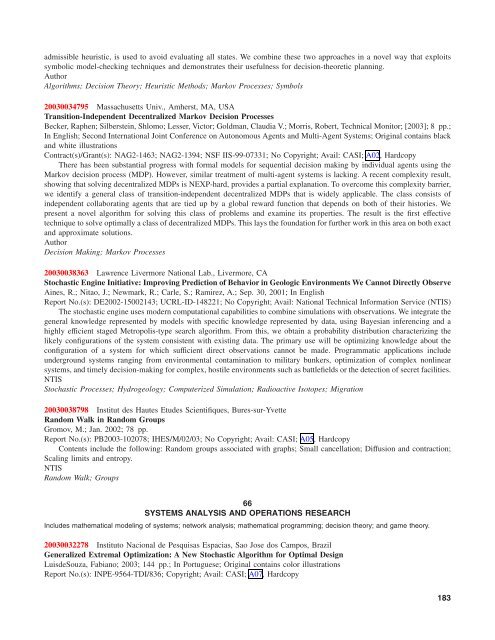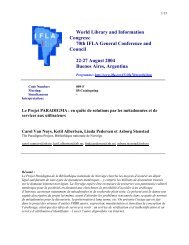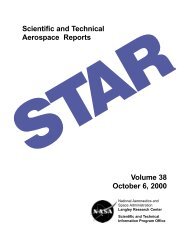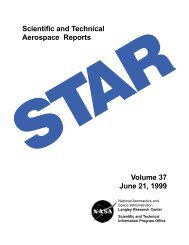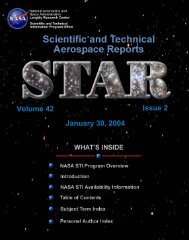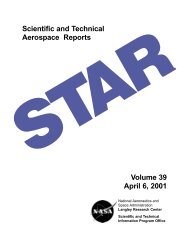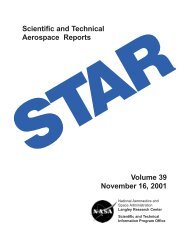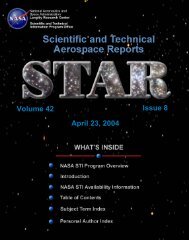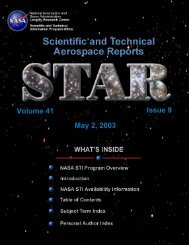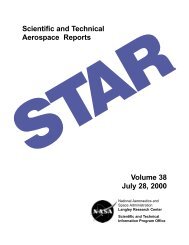Issue 10 Volume 41 May 16, 2003
Issue 10 Volume 41 May 16, 2003
Issue 10 Volume 41 May 16, 2003
- TAGS
- volume
- 202.118.250.135
Create successful ePaper yourself
Turn your PDF publications into a flip-book with our unique Google optimized e-Paper software.
admissible heuristic, is used to avoid evaluating all states. We combine these two approaches in a novel way that exploits<br />
symbolic model-checking techniques and demonstrates their usefulness for decision-theoretic planning.<br />
Author<br />
Algorithms; Decision Theory; Heuristic Methods; Markov Processes; Symbols<br />
<strong>2003</strong>0034795 Massachusetts Univ., Amherst, MA, USA<br />
Transition-Independent Decentralized Markov Decision Processes<br />
Becker, Raphen; Silberstein, Shlomo; Lesser, Victor; Goldman, Claudia V.; Morris, Robert, Technical Monitor; [<strong>2003</strong>]; 8 pp.;<br />
In English; Second International Joint Conference on Autonomous Agents and Multi-Agent Systems; Original contains black<br />
and white illustrations<br />
Contract(s)/Grant(s): NAG2-1463; NAG2-1394; NSF IIS-99-07331; No Copyright; Avail: CASI; A02, Hardcopy<br />
There has been substantial progress with formal models for sequential decision making by individual agents using the<br />
Markov decision process (MDP). However, similar treatment of multi-agent systems is lacking. A recent complexity result,<br />
showing that solving decentralized MDPs is NEXP-hard, provides a partial explanation. To overcome this complexity barrier,<br />
we identify a general class of transition-independent decentralized MDPs that is widely applicable. The class consists of<br />
independent collaborating agents that are tied up by a global reward function that depends on both of their histories. We<br />
present a novel algorithm for solving this class of problems and examine its properties. The result is the first effective<br />
technique to solve optimally a class of decentralized MDPs. This lays the foundation for further work in this area on both exact<br />
and approximate solutions.<br />
Author<br />
Decision Making; Markov Processes<br />
<strong>2003</strong>0038363 Lawrence Livermore National Lab., Livermore, CA<br />
Stochastic Engine Initiative: Improving Prediction of Behavior in Geologic Environments We Cannot Directly Observe<br />
Aines, R.; Nitao, J.; Newmark, R.; Carle, S.; Ramirez, A.; Sep. 30, 2001; In English<br />
Report No.(s): DE2002-15002143; UCRL-ID-148221; No Copyright; Avail: National Technical Information Service (NTIS)<br />
The stochastic engine uses modern computational capabilities to combine simulations with observations. We integrate the<br />
general knowledge represented by models with specific knowledge represented by data, using Bayesian inferencing and a<br />
highly efficient staged Metropolis-type search algorithm. From this, we obtain a probability distribution characterizing the<br />
likely configurations of the system consistent with existing data. The primary use will be optimizing knowledge about the<br />
configuration of a system for which sufficient direct observations cannot be made. Programmatic applications include<br />
underground systems ranging from environmental contamination to military bunkers, optimization of complex nonlinear<br />
systems, and timely decision-making for complex, hostile environments such as battlefields or the detection of secret facilities.<br />
NTIS<br />
Stochastic Processes; Hydrogeology; Computerized Simulation; Radioactive Isotopes; Migration<br />
<strong>2003</strong>0038798 Institut des Hautes Etudes Scientifiques, Bures-sur-Yvette<br />
Random Walk in Random Groups<br />
Gromov, M.; Jan. 2002; 78 pp.<br />
Report No.(s): PB<strong>2003</strong>-<strong>10</strong>2078; IHES/M/02/03; No Copyright; Avail: CASI; A05, Hardcopy<br />
Contents include the following: Random groups associated with graphs; Small cancellation; Diffusion and contraction;<br />
Scaling limits and entropy.<br />
NTIS<br />
Random Walk; Groups<br />
66<br />
SYSTEMS ANALYSIS AND OPERATIONS RESEARCH<br />
Includes mathematical modeling of systems; network analysis; mathematical programming; decision theory; and game theory.<br />
<strong>2003</strong>0032278 Instituto Nacional de Pesquisas Espacias, Sao Jose dos Campos, Brazil<br />
Generalized Extremal Optimization: A New Stochastic Algorithm for Optimal Design<br />
LuisdeSouza, Fabiano; <strong>2003</strong>; 144 pp.; In Portuguese; Original contains color illustrations<br />
Report No.(s): INPE-9564-TDI/836; Copyright; Avail: CASI; A07, Hardcopy<br />
183


